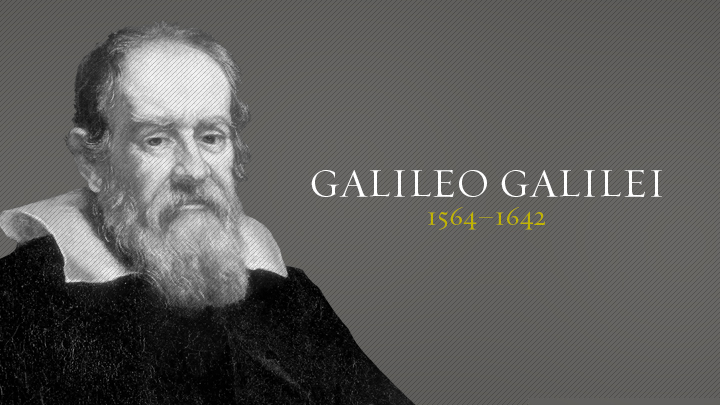"God is known by nature in his works, and by doctrine in his revealed word."
Galileo Galilei, though famous for his scientific achievements in astronomy, mathematics, and physics, and infamous for his controversy with the church was, in fact, a devout Christian who saw not a divorce of religion and science but only a healthy marriage: "God is known by nature in his works, and by doctrine in his revealed word."
Irritating young genius
Galileo never got his university degree. He studied for four years and dropped out, then studied on his own for two years, living as a tutor and publishing solutions to complex problems. This brilliance got him the chair of mathematics at the University of Pisa, where he immediately made enemies. The "natural philosophers" of his day made their discoveries debating the works of Aristotle. Galileo believed in observing nature under controlled conditions and describing the results mathematically. This difference alone created friction, but Galileo humiliated his enemies with public demonstrations of their errors—for example, Galileo proved, contra Aristotle, that bodies of different weights would fall at the same velocity. His enemies ran him off in two years. Friends got him the chair of mathematics at Padua, a more progressive institution, which he occupied for 18 years. These were his happiest and most productive days, during which he explored physics in ways that were to bear much fruit.
Detoured by the telescope
In 1609 Galileo heard of a device to make distant objects appear closer, and the applications of such an instrument were immediately obvious to Galileo. He quickly put together a telescope and displayed it to the Venetian Senate, which was so impressed, it immediately doubled his salary. That winter he turned his telescope on the sky and made some astounding discoveries. In complete contravention of accepted beliefs, he saw that the moon was not a smooth sphere, that Jupiter had moons, and that Venus had phases, indicating it orbited the sun. He published a small pamphlet describing his observations in 1610. It made him world-famous.
At 46, after 20 years of quiet study, he was now in demand. Lured to Tuscany with a grand salary, Galileo abandoned his wife and put his daughters in a convent. He made a triumphant visit to Rome, where the papal court vied to do him honor. The head of church astronomers confirmed his discoveries, and Jesuit astronomers jostled to look through the telescope.
Timeline |
|
|
1537 |
Niccolo Tartaglia maps trajectory of a bullet |
|
1543 |
Nicolaus Copernicus' heliocentric theory published |
|
1555 |
Latimer and Ridley burned at stake |
|
1564 |
Galileo Galilei born |
|
1642 |
Galileo Galilei dies |
|
1656 |
Christian Huygens discovers rings and moons of Saturn |
But his academic enemies were not finished. They induced Dominican friars to preach on such texts as "Ye men of Galilee, why stand ye gazing up into heaven?" and cast Galileo's views—especially his support of the Copernican discovery that the earth revolved around the sun—in the worst possible light. The feeling in Rome was that Copernicus's views would be more devastating to the church than those of Luther or Calvin. Pope Paul V ordered the Inquisition to look into the matter.
Trials and silence
Galileo contended that proper interpretation of Scripture would agree with observed fact. The "Book of Nature," written in the language of mathematics, would agree with the "Book of Scripture," written in the everyday language of the people. Besides, the "Bible teaches men how to go to heaven, not how the heavens go," and that it would be "a terrible detriment for the souls if people found themselves convinced by proof of something that it was made then a sin to believe."
But the Inquisition ruled against him in 1616. This was not as unreasonable as it appears. His position flew in the face of common sense and 1,500 years of academics. It violated the accepted laws of physics. The star parallaxes demanded by this system could not be observed (and would not be until 1838). The Inquisition condemned the Copernican system and forbade Galileo from teaching it as fact.
But Galileo the scientific combatant never gave up. When a friend was elected pope in 1623, Galileo went to see him, but Urban VIII would not lift the injunction for fear of undermining church authority. Galileo did obtain permission to write about "the systems of the world," both Ptolemaic and Copernican, as long as he discussed them noncommittally and came to the conclusion dictated to him in advance by the pontiff—that is, that man cannot presume to know how the world is really made because God could have brought about the same effects in ways unimagined by him, and he must not restrict God's omnipotence.
So Galileo embarked on his Dialogue Concerning the Two Chief World Systems (1632). As soon as it came out, with the full and complete imprimatur of the censors, it was greeted with applause and cries of praise from every part of Europe as a literary and philosophical masterpiece. But even though formally noncommittal, it clearly championed the Copernican system and featured a dull defender of Ptolemy in whom the pope saw too much of himself.
Galileo was called back before the Inquisition in 1633. A document was produced (later proved a forgery by historians) that said Galileo had promised not to write about the Copernican system whatsoever. The old fighter, now 70, was ordered to renounce publicly his teachings and submit to house arrest.
In his last years, he published a compendium of his earlier work in physics—Dialogue Concerning Two New Sciences, his greatest achievement—and shortly thereafter went blind.
It wasn't until 1981 that the Catholic church ordered a commission to look into Galileo's case, and another 11 years before the commission acknowledged the "errors" of Galileo's judges.










